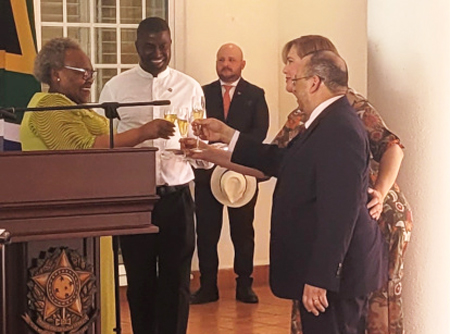Brazil is a Leading Power in a Rapidly Changing Global Order
by Kirtan Bhana - TDS

9 September 2024
Brazil, celebrated its National Day on September 7th, marking its independence from Portugal in 1822. As the largest economy in South America and a prominent player on the global stage, Brazil is a country of vast natural resources, cultural richness, and economic potential that is increasingly significant in a rapidly transitioning global world order.
Geographically, Brazil is the fifth-largest country in the world and the third largest in the Americas after Canada and the United States. Its topography is famously dominated by the Amazon River, the second-largest river globally, and the Amazon Rainforest, which is not only the world's largest tropical rainforest but also one of its most biodiverse regions. The Amazon basin is home to an incredible array of plants, animals, and insects, making Brazil a critical player in global environmental sustainability and biodiversity conservation.
During a reception held in Pretoria, South Africa, to celebrate Brazil's independence, the Ambassador of the Federative Republic of Brazil to South Africa, Mr. Benedicto Fonseca Filho, highlighted Brazil’s development journey and its evolving role in international relations. The event was attended by distinguished guests, including South African Minister of Social Development Nokuzola Tolashe, underscoring the strong and enduring ties between Brazil and South Africa. These ties are further enriched by historical connections, as Brazil is home to the world’s largest African diaspora, reflecting a deep and complex shared heritage between the two nations.
Brazil’s economy, with a GDP of $3.7 trillion USD, is the largest in South America and one of the top ten in the world. Its diverse economic base spans agriculture, manufacturing, services, and natural resources. Brazil is the world’s leading producer of raw sugar and is also a top exporter of coffee, soybeans, and other agricultural products, reinforcing its role as a global food powerhouse. The nation’s aerospace corporation, Embraer, is the third-largest manufacturer of civil aircraft worldwide, demonstrating Brazil’s advanced industrial capabilities. Meanwhile, Marco Polo, the leading bus manufacturer in Latin America, has operations around the world, including in South Africa, showcasing the country's global commercial reach.
Brazil’s population of approximately 434 million people is a vibrant melting pot of cultures, customs, and traditions, with over 200 indigenous languages spoken alongside Portuguese, the nation’s official language. This cultural diversity is a cornerstone of Brazil’s national identity, blending indigenous, African, European, and Asian influences into a unique and dynamic society.
A demonstration of the Afro-Brazilian martial arts of Capoeira - (video credit: TDS)
In the realm of international diplomacy, Brazil is an active participant in both bilateral and multilateral engagements. Ambassador Fonseca Filho spoke about Brazilian President Luiz Inácio Lula da Silva’s recent visit to South Africa to attend the BRICS Summit in Johannesburg. He also highlighted the trilateral cooperation between India, Brazil, and South Africa (IBSA), established in 2003, which emphasizes South-South cooperation and strategic partnership. Looking ahead, South Africa and Brazil will host back-to-back G20 summits in 2024 and 2025, respectively, highlighting their growing influence on the world stage.
Brazil’s commitment to environmental leadership was first showcased during the historic Earth Summit in 1992, held in Rio de Janeiro. Known as the Rio Summit, it was convened during the optimistic post-Cold War era and set the stage for global environmental action. Today, Brazil is poised to continue this legacy as it prepares to host COP 30 in November in the city of Belém do Pará. This conference presents an important opportunity for Brazil to drive forward real solutions for ecological preservation and conservation, steering the global dialogue away from overly politicized and financially unrealistic models and towards actionable and sustainable environmental policies.
Brazil’s journey from independence to its current status as a leading global power is a testament to its resilience, diversity, and strategic importance. As the world faces new challenges and shifts in the global order, Brazil’s role as a dynamic and influential player will continue to grow, reinforcing its position not just as a regional leader, but as a nation with a significant voice on the world stage.
